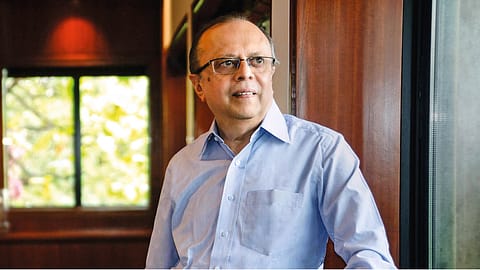Sticky Customers Strengthen Parekh’s Bond With Markets
Innovation and tight focus on margins keep investors happy with Pidilite Industries.

This story belongs to the Fortune India Magazine September 2024 issue.
WHEN FEVICOL was rolled out in India in 1959, it changed the lives of carpenters and woodworkers by offering a synthetic alternative to animal and vegetable glue. B.K. Parekh, the founder chairman of Pidilite Industries, engaged directly with carpenters instead of dealers, fostering lasting connections and getting genuine feedback.
At a time when adhesives were unbranded, he built a brand around a single product. His son and current chairman, Madhukar Parekh, who took over the reins in 1992, continued innovation in manufacturing as well as marketing by rolling out products such as Fevikwik, M-Seal, Dr Fixit, Fevicryl and Fevistik. Pidilite is now market leader in India in adhesives and sealants across all three segments — branded consumer products, trade products and industrial products. Parekh and family owned 69.75% of Pidilite at the end of June. Their net worth rose 16.53% from ₹93,254 crore to ₹1,08,666 crore. The Parekh family created this wealth by growing both organically and inorganically and razor-sharp focus on operational efficiency that is evident in Pidilite’s high Ebitda margins that have been hovering in the 17-23% range — one of the highest in the industry — for last five years. Managing director Bharat Puri says the company will continue its growth trajectory. “Given the regular course of business, we will be at 20-24% (Ebitda) margins, unless something goes out of hand geopolitically,” he says.
The margins reflect operational efficiency for which the stock market has rewarded the company, says G. Chokkalingam, founder and MD of Equinomics Research. He credits acquisition strategies for rise in valuation and promoter wealth. During Covid, when most businesses were not doing well, Pidilite acquired U.S.-based Huntsman Group’s Indian subsidiary for ₹2,100 crore. Huntsman Advanced Materials Solutions was directly competing with Fevicol through its adhesives, sealants and other products, the most prominent being Araldite. “It takes a lot of courage and conviction to acquire a company that was one-third its balance sheet then. Margins slipped to 17%, but were restored soon. The acquisition resulted in revenue and cost synergies,” says Chokkalingam.
Another growth factor has been innovation to broaden the product portfolio. “Innovation is one of our differentiators and strong growth drivers. A third of our growth must come out of innovation,” says Puri.
Pidilite has increased R&D spending by over 200% since 2015. Each of its divisions launches one or two major products every six-nine months. “Pidilite model is to look at pioneer categories, turn them into growth categories and then turn growth categories into core categories,” says Puri. For instance, tile adhesives were a pioneer initiative five years back. “We had just started the journey. Today, it is a clear growth initiative. Over last four years, the business has gone up eight-nine times. We will keep identifying categories, get consumer validation and then turn them into growth categories,” says Puri.
Pidilite continues to invest in future-ready supply chain and building capacity. It commissioned 10 plants in FY24. It is also globalising operations by entering newer markets through acquisitions or greenfield investments. This is vital as the company now directly competes with most global majors in the Indian market. Global presence also de-risks it from a potential price war as many deep-pocketed players eye a slice of Pidilite’s lucrative white adhesive market.